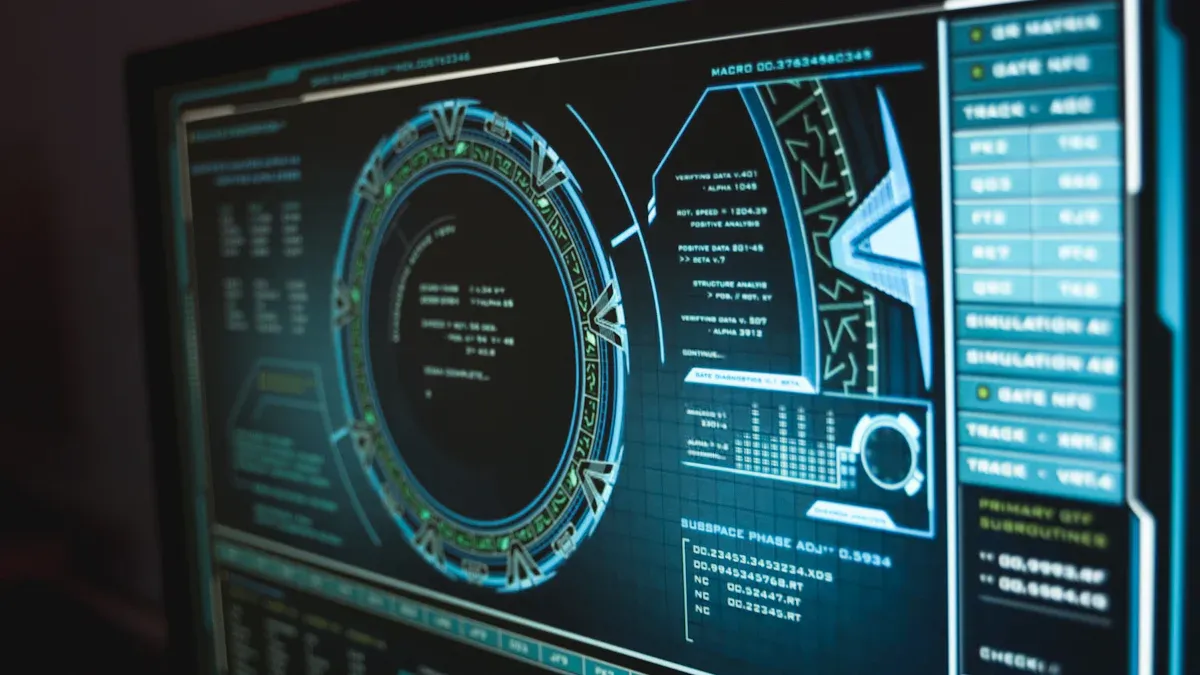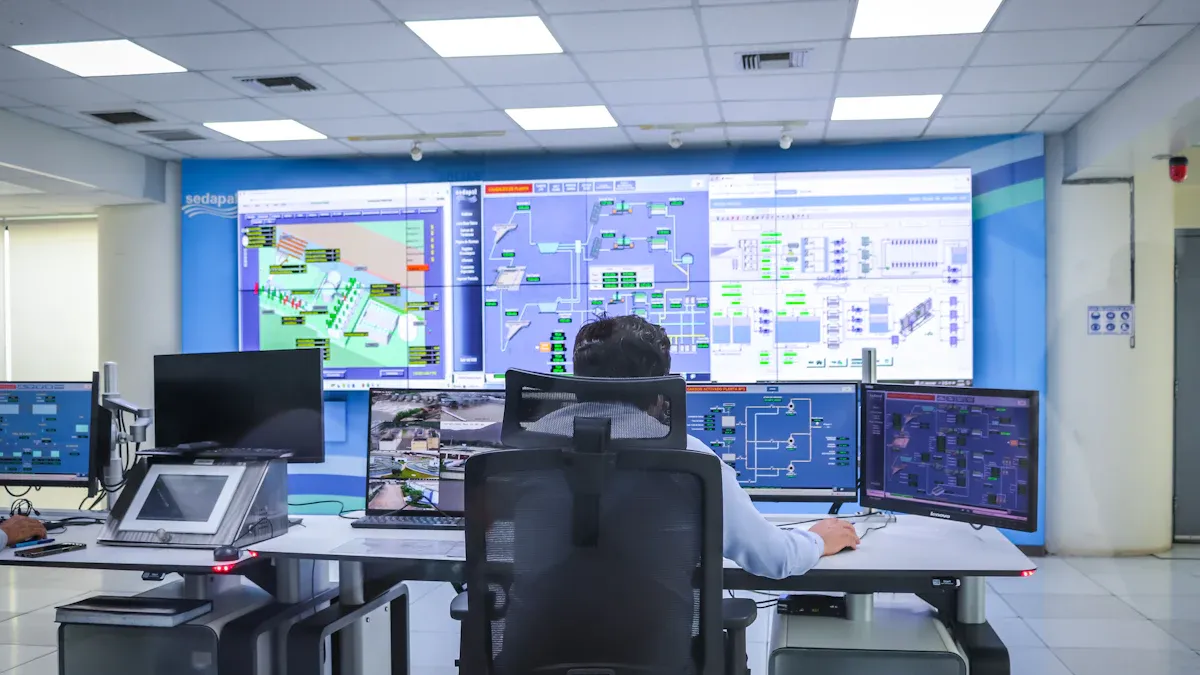
Corporate global security solutions give companies strong tools and expert help. These help protect against many different threats. Businesses now face risks from cyberattacks and physical break-ins. They also face new global problems. Top companies use advanced technology and skilled workers. They also offer special services like the VERTU Ruby Key. This helps give strong protection. Security operations centers watch things in real time. They use smart analytics to spot problems. Teams of experts act fast when something happens. These global security solutions show why companies need corporate security. They help keep people safe and let work go on without stopping.
Key Takeaways
Corporate global security solutions keep people, property, and data safe. They use technology and trained teams to do this. These solutions have many layers to stop threats. They use physical security, network protection, and user training. Global Security Operations Centers watch for risks all day and night. They help companies act fast when there is danger. Risk assessments and regular checks find weak spots. They help companies get ready for emergencies. Picking the right security provider is important. You should look for experience, good technology, support, and clear costs.
Corporate Global Security Solutions
Key Elements
Corporate global security solutions use technology, people, and good plans. These solutions help protect companies from threats inside and outside. They help companies lower risk and keep things safe. The corporate security function uses many tools and ideas to build strong defenses.
Visitor Management Systems watch who comes into a building. This helps follow rules and keeps records for safety.
Endpoint Protection keeps computers and phones safe. It blocks viruses, phishing, and stops data from being lost.
Email Security uses codes and filters to stop spam and bad messages.
Antivirus Protection finds and removes malware. It updates often to fight new dangers.
Web Security keeps websites and online tools safe from attacks and leaks.
Identity Access Management (IAM) controls who can use company systems. Only people who are allowed can get in.
The corporate security function also works on risk management. Teams look for problems before they happen. They use technology to watch for threats and act fast. Global Security Operations Centers (GSOCs) are very important. They watch both real places and online spaces all the time. GSOCs use smart tools and screens to find issues quickly. This helps companies fix problems before they get worse.
Doing things well is also important. The corporate security function checks how things are working and tries to get better. Teams from different parts of the company work together. They use good ways of working and follow rules for the industry. This helps companies handle different risks in different places. Security programs give many layers of protection, from daily checks to looking for big threats.
Note: A strong corporate security function needs both technology and skilled people. This mix helps companies stop threats and keep business going well.
Main Objectives
The main goals of corporate global security solutions are to protect people, things, and information. These solutions try to lower risk and help the company reach its goals. The corporate security function sets clear goals for every security program.
Keep company property and data safe from threats.
Stop cyber threats with new technology and smart actions.
Make sure the company follows all laws and rules.
Lower the chance of crimes and stealing ideas.
Build a place where everyone cares about security.
Act fast when something happens and stop losses.
Keep workers safe and protect important information.
Help teams work together for better security.
Check security programs often and fix weak spots.
Make sure everyone helps keep the workplace safe.
Corporate global security solutions help big companies by giving them choices. GSOCs can be at the company, online, or both. This lets companies pick what works best for them. These centers give updates right away and help teams work together everywhere. Security programs match business goals, so the most important risks get attention. This helps the company grow and keeps its good name.
Risk intelligence is very important for these goals. Teams collect information to find new risks early. They use this to make better choices and stop problems. Regular checks and training help everyone get ready for new threats. The corporate security function looks at numbers to see what works and what needs to get better.
Security programs must be able to change. Companies face different risks in each country. The corporate security function changes to fit local laws and ways of doing things. This helps keep the company safe everywhere it works.
How Corporate Security Works

Processes and Layers
Corporate security uses many layers to keep companies safe. Each layer has its own job. All the layers work together to make a strong defense. Companies add these layers one at a time. This helps cover all kinds of risks.
Physical Security
This is the first step in keeping things safe. Companies use locks and cameras to stop people who should not enter. Guards and alarms help protect people and things.Network Security
This layer keeps data safe as it moves in the network. Firewalls and special software block hackers. Secure routers help stop people from misusing information.Perimeter Security
Firewalls and detection systems guard the network’s edge. These tools stop outside threats before they get in.Endpoint Security
Laptops and phones connect to the network every day. Antivirus software and firewalls keep these devices safe. Encryption helps protect them from attacks.Data Protection and Backup
Companies save copies of important data often. They use encryption to keep information safe. This makes sure data is there when needed.Application Security
Secure coding and updates help keep software safe. Companies test for weak spots and fix them fast.User Education and Training
Employees learn how to stay safe online. Training helps them spot fake emails and use good passwords. This lowers mistakes that can cause problems.Monitoring Systems
Tools watch for strange activity all the time. These systems send alerts if something looks wrong. Teams can act fast to stop trouble.
Note: Each layer adds more protection. If one layer fails, others help stop threats from causing harm.
Technology and GSOCs
Technology is very important for corporate security today. Companies use smart tools to watch for threats and act fast. Global Security Operations Centers (GSOCs) bring people and technology together.
GSOCs are the main place for the corporate security function. Skilled teams work all day and night to watch for threats. They use video cameras, access controls, and smart analytics to see what is happening.
These centers protect people and company property. They give leaders quick updates and help make fast choices in emergencies.
GSOCs handle many jobs like physical security, travel risk, cyber operations, and crisis response. They use command and control platforms to link all parts of security.
Integrated technology stacks help GSOCs work better. Video analytics, threat intelligence, and travel tracking tools send information to one place. This helps teams spot risks and act quickly.
GSOCs need skilled staff and strong leaders to do well. Teams must understand the data and act fast to keep the company safe.
Many companies use managed GSOC solutions. These services help with problems like not enough staff or money. Managed solutions make security stronger and work better.
Tip: Using both technology and skilled people makes a strong defense. Corporate security function needs both to keep companies safe as things change.
Corporate security systems must change to face new threats. By using many layers and smart technology, companies can control risks and keep business running well.
Services Offered by Global Security Company
Risk Assessment
A global security company begins with a careful risk assessment. This helps companies find dangers to people, things, and data. Experts use frameworks like ISO 31000 and NIST Cybersecurity Framework. They also use the ASIS International Security Risk Assessment Standard. These methods help teams spot, study, and judge risk. Companies look at both physical and digital threats. They use data and analytics to find weak spots. Scenario planning helps them see what could go wrong.
Step | Description |
|---|---|
Risk Identification | Find threats to global operations using scanning and analysis. |
Risk Analysis | Measure the chance and impact of each risk. |
Risk Mitigation | Create plans to lower or manage risk. |
Monitoring & Review | Track risk and update plans as new threats appear. |
Doing risk assessments often helps companies avoid problems. It also helps them follow rules and spend money wisely. These checks help companies stop threats before they happen.
Physical Security
A global security company gives strong physical security. Teams use fences and warning signs to scare off intruders. Cameras, motion sensors, and alarms help spot trouble. Access controls and lockdowns slow down intruders. Security guards and quick response systems protect people and property. Many companies now use cloud computing and AI to make these services better.
Physical and digital security work together. For example, access control can connect with encryption and intrusion detection. This makes it easier to find threats and keep data safe. Training staff and planning for emergencies are also important for physical security.
Cybersecurity
Cybersecurity is a big part of corporate security services. A global security company does security checks and penetration testing. They use risk-based controls to keep things safe. Teams fix weak spots and give advice about following rules. They look for threats and act fast when something happens.
To fight new dangers like ransomware and phishing, companies use many layers of defense. These include system hardening and multi-factor authentication. Managed detection services help too. Teaching users and making strong password rules help stop attacks. Regular updates and watching systems keep things safe.
Executive and Travel Protection
Executives and travelers have special risks. A global security company gives personal protection and safe travel. They also check homes for safety. Teams plan safe routes and give secure rides. They watch for threats in real time. Event security, crowd control, and emergency help are also included.
Luxury services like the VERTU Ruby Key mix travel security with special help. With one tap, executives get VIP travel bookings and private guides. They also get fast airport help. The Ruby Key gives healthcare access and digital services. This makes it a safe and easy choice for global leaders.
Note: Global security companies change their services for each industry. They use smart analytics, hybrid solutions, and custom plans to fit every client’s needs.
Benefits for Organizations
Risk Reduction
When organizations use global security solutions, they get big benefits. These solutions help companies find weak spots before trouble starts. They use frameworks like ISO 27001, SOC2, and GDPR to make strong rules. These rules help manage cyber risks in many places. Security teams watch for threats in real time. They use threat intelligence to spot danger fast. This helps them act quickly and lower damage.
Companies can find weak points and set security rules.
They check for risks and watch third-party partners.
Certifications prove a company cares about security and builds trust.
Security teams use numbers to track how well they do. For example, they count how many people click on fake emails. They also see how much money they save by stopping attacks. These numbers show real progress and help companies make smart choices.
Business Continuity
Business continuity means keeping things running during a crisis. Global security solutions help companies get ready for emergencies. Teams start by checking for risks and seeing what could go wrong. They make plans to keep working and test them often. Training helps staff know what to do in a crisis.
Companies make crisis plans and practice them.
Emergency teams get ready for all kinds of problems.
Regular checks keep plans up to date.
These steps help companies bounce back after a crisis. They also make sure important work keeps going. By planning ahead, companies protect people and things.
Tip: A good business continuity plan helps companies feel ready for any crisis.
Reputation and Compliance
A good reputation and following rules help companies grow. Global security solutions help with both by making sure companies follow world rules. Automated tools check for new laws and tell teams about changes. Security teams watch vendors and make reports for leaders.
Companies check their supply chain and look at third-party security.
Regular checks and training help with compliance.
Emergency plans help companies stay ready for new rules.
These actions protect the company’s name and help avoid fines. They also show customers and partners that the company takes security and rules seriously.
Choosing a Global Security Company
Evaluation Criteria
Picking the best partner for corporate security takes careful thought. Companies need to find providers who have done global work before. If a provider has worked with international security companies, they likely have good skills and tools. The provider should give solutions that can grow as the company grows. Companies must check if the provider can help many locations and handle new risks.
A strong security company uses new technology and has trained workers. They should have teams for both physical and digital safety. Companies also need to see how the provider handles projects, from start to finish. It is important to know all costs. Providers must explain all fees, including those for software or cloud services.
Criteria | What to Look For |
|---|---|
Experience | Global reach, industry expertise |
Scalability | Ability to grow with your business |
Integration | Compatibility with existing systems |
Support | Local staff, 24/7 help, clear service plans |
Technology | Use of emerging trends and strong analytics |
Cost | Transparent pricing, clear contract terms |
Tip: Companies have many problems when starting corporate security. A good provider helps fix these problems with flexible and strong solutions.
Questions to Ask
When picking a corporate security system, leaders should ask important questions. These questions help match the company’s needs with the right solutions:
What kind of security system fits my business size and risk?
Can the system and provider grow as my business gets bigger?
Will the system work with other tech like fire alarms?
What steps are there for setup, advice, and staff training?
Do I need video cameras, and how much do I need?
Should I pick cloud or on-site solutions for my data?
How does the provider check sites and suggest the best plan?
What types of security solutions does the provider have?
How many local staff and engineers help far-away places?
What skills do their network security experts have?
Can the provider help both national and global sites?
How do they handle project setup and support after?
Which parts do they do themselves and which are given to others?
How is service handled after everything is set up?
What are the one-time and regular costs? 16. What new security tech or trends should I think about for upgrades?
These questions help companies solve problems and make smart choices. The right provider will answer clearly and show how their solutions fit the company’s needs.
Corporate global security solutions keep people, assets, and data safe. They use new technology, skilled teams, and special services. Companies use tools like GSOCs and luxury services like VERTU Ruby Key. Security is changing because of new trends:
Supply chain attacks and third-party risks need better controls.
AI helps teams deal with tough threats and do simple jobs faster.
Easy-to-use cloud tools and training help more people use security.
Trust and teamwork between providers and clients are very important.
Organizations now build flexible security cultures and update training often. They make sure their plans match business goals. As threats change, companies must stay quick and use new ideas. This helps keep their work safe and strong.
FAQ
What is a Global Security Operations Center (GSOC)?
A GSOC is the main place for security work. Teams watch for threats and handle problems fast. They use smart technology to help keep people and things safe. GSOCs help companies act quickly when there is danger.
How does VERTU Ruby Key support executive security?
VERTU Ruby Key gives special travel and help services. Executives get VIP travel, private guides, and quick airport help. The Ruby Key mixes luxury with strong safety for leaders around the world.
Why do companies need both physical and cybersecurity?
Physical security keeps buildings and people safe. Cybersecurity protects data and computer systems. Companies need both to stop all kinds of threats. This helps business keep running without trouble.
What makes a good global security provider?
A good provider has skilled teams and uses new technology. They give flexible help, cover many places, and act fast when risks show up. It is important that they have experience working worldwide.
How often should companies review their security plans?
Companies should check their security plans at least once a year. Regular checks help find new dangers and keep defenses strong. Training and updates make sure everyone is ready.







